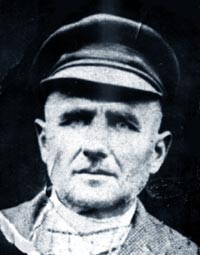









 Julian Franzevich KAUFELT (or KAUFELD), 1882-1937, glass-blower, of German
descent, born in the district of Polotskoe, province of Vitebsk, lived with his
family in Rokitno, which is today known as the Rovno region. In 1926 he crossed
the Soviet border together with his family. He was sent to a place called
BAKHMUT (today ARTYOMOVSK in the DONEZ region). There he also had a job in a
glass-blowing work-shop.
Julian Franzevich KAUFELT (or KAUFELD), 1882-1937, glass-blower, of German
descent, born in the district of Polotskoe, province of Vitebsk, lived with his
family in Rokitno, which is today known as the Rovno region. In 1926 he crossed
the Soviet border together with his family. He was sent to a place called
BAKHMUT (today ARTYOMOVSK in the DONEZ region). There he also had a job in a
glass-blowing work-shop.
In the year 1927 he was accused of being a Polish defector, arrested “in connection with the murder of Voykov” and exiled to BIYSK. His wife and children followed him to the Altai. After J. KAUFELT’s release the family moved to BOBRUYSK; only Georg Julianovich KAUFELT (or KAUFELD), 1908-1938, stayed in BIYSK, for he had already started a family. Later he worked as a forwarder in the “Katun” cattle breeding sovkhoz in the district of BIYSK.
On the 18.02.1938 the Soviets arrested Georg Julianovich KAUFELT. He was arrested by an assistant of the authorized representative CHUGUNOV of the NKVD District Department, who took away his passport, military passport and an extract from the birth records and then transported him away to the prison in BIYSK.
G. KAUFELT was sentenced by the OSO of the NKVD (or possibly by the Dvoika?) to maximum penality on section 58-2,6,9,11 (probably because of the “Polish affair”, since, upon his arrest, he was registered as being a Pole) on the 09.07.1938. He was shot dead in BIYSK on the 08.08.1938 and posthumously rehabilitated by the Military Tribunal of the Sibirian Military District on the 15.11.1957.
Having returned from exile JULIAN Franzevich KAUFELT, together with his wife and children, lived in the settlement of GLUSHA, district of BOBRUYSK, MOGILYOVSK region. He worked as a master glass-blower for the “Komintern” glass-works.
On the 26.04.1932 the Communists arrested him again and took him to the prison in BOBRUYSK, where he was questioned by an interrogator called ZUBRITSKIY. On the 08.10.1932 the OSO of the OGPU sentenced him to three years of “Minusses”
(exile = “revokation of someone’s right of residence) on sections 68, 72 (which corresponds to sections 58-6, 10), again for reasons of the “Polish affair”. However, the serving of his sentence only began to be in force on the 08.10.1932 and not on the day, when he had been arrested. Together with him another 10 persons were sentenced to just the same kind of exile (probably ethnic Poles or Polish citizens):
In fact, this banishment and the internal exile were in no way different from each-other. JULIAN Franzevich KAUFELT was sent to the SNAMENSK glass-works, 50 km away from KRASNOYARSK. Once again his wife and children followed him there. Payment was extremely bad, and early in 1933 J. KAUFELT received the permission to move to KRASNOYARSK. The family settled down in a barrack on the right banks of the river, in a place called Zaton, where the ships were moored in winter.
In 1935 the banishment (which, in fact, was aninternal exile) expired and J. KAUFELT, his wife and the two younger children made their way to BOGASHEVO station in the district of TOMSK, to the factory construction combine. There he worked in the local glass-works.
The Soviets arrested him on the 28.10.1937. He was taken away by a certain SAVCHENKO of the Tomsk town department of the NKVD, who put him to the prison in TOMSK. The questionnaire was only filled out on the 06.11.1937 (probably because of the great number of arrested persons).
He was sentenced by a Dvoika on the 14.12. 1937 to maximum penality on sections 58-2,6,7,8,9,10,11 and shot by a firing squad in TOMSK on the 25.12.1937.
He was posthumously rehabilitated by the Military Tribunal of the Siberian Military District on the 12.02.1960. As per the file issued on him in 1932, he was rehabilitated by the Military Prosecutor of the Belorussian Military District on the 22.08.1989.
18.12.2001, recorded by V.S. Birger, Krasnoyarsk, “Memorial” Society
Archives